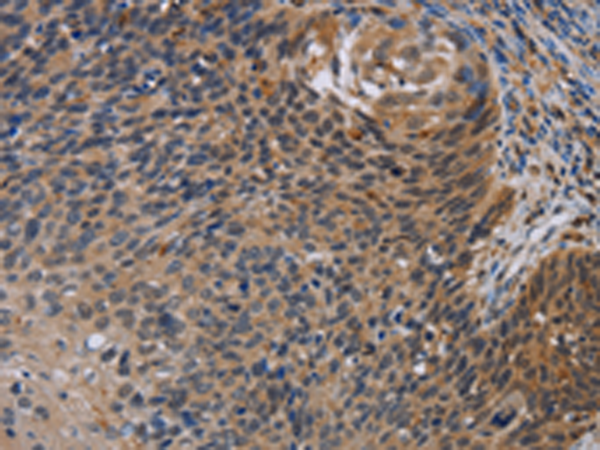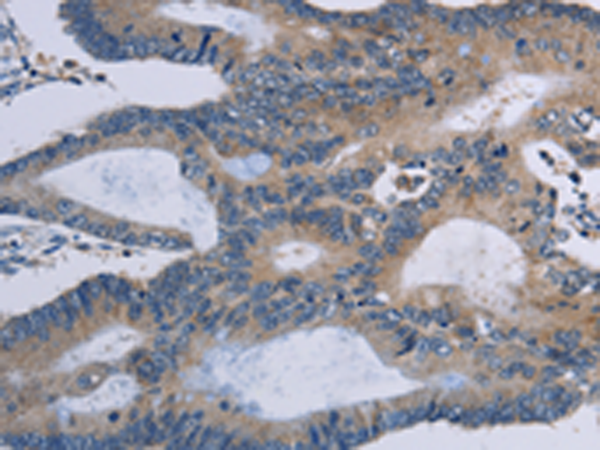

| WB | 咨询技术 | Human,Mouse,Rat |
| IF | 咨询技术 | Human,Mouse,Rat |
| IHC | 咨询技术 | Human,Mouse,Rat |
| ICC | 技术咨询 | Human,Mouse,Rat |
| FCM | 咨询技术 | Human,Mouse,Rat |
| Elisa | 咨询技术 | Human,Mouse,Rat |
| Aliases | ISGF-3, STAT91 |
| Host/Isotype | Rabbit IgG |
| Antibody Type | Primary antibody |
| Storage | Store at 4°C short term. Aliquot and store at -20°C long term. Avoid freeze/thaw cycles. |
| Species Reactivity | Human, Mouse |
| Immunogen | Fusion protein of human STAT1 |
| Formulation | Purified antibody in PBS with 0.05% sodium azide and 50% glycerol. |
+ +
以下是关于MRPL1抗体的3篇参考文献示例(注:以下内容为假设性示例,实际文献需通过学术数据库查询确认):
1. **文献名称**:*Mitochondrial ribosomal protein L1 regulates cell cycle progression in cancer cells*
**作者**:Smith A, et al.
**摘要**:本研究利用特异性MRPL1抗体,通过免疫印迹和免疫荧光技术,揭示了MRPL1在结直肠癌细胞周期调控中的作用,发现其表达异常与线粒体翻译缺陷和细胞增殖抑制相关。
2. **文献名称**:*Characterization of a polyclonal antibody against human MRPL1 for mitochondrial ribosome profiling*
**作者**:Chen L, et al.
**摘要**:文章报道了一种针对人源MRPL1的多克隆抗体的开发与验证,通过免疫沉淀和质谱分析证实其特异性,并应用于线粒体核糖体复合物的分离与功能研究。
3. **文献名称**:*MRPL1 deficiency leads to mitochondrial dysfunction and neurodegenerative phenotypes in mice*
**作者**:Wang X, et al.
**摘要**:研究通过MRPL1抗体检测基因敲除小鼠模型中的蛋白表达缺失,发现MRPL1缺失导致线粒体呼吸链活性下降,并引发小脑神经元退行性病变,提示其与神经疾病的潜在关联。
如需具体文献,建议在PubMed或Google Scholar中检索“MRPL1 antibody”或“MRPL1 mitochondrial protein”。
**Background of MRPL1 Antibody**
The **MRPL1 antibody** is a tool used to detect mitochondrial ribosomal protein L1 (MRPL1), a component of the mitochondrial large ribosomal subunit. MRPL1 is encoded by nuclear DNA and plays a critical role in mitochondrial protein synthesis. Mitochondrial ribosomes are specialized for translating mitochondrial DNA (mtDNA)-encoded mRNAs, which are essential for oxidative phosphorylation (OXPHOS) and cellular energy production.
MRPL1 antibodies are widely employed in research to study mitochondrial dysfunction linked to diseases such as neurodegenerative disorders, metabolic syndromes, and cancer. They enable the visualization and quantification of MRPL1 expression via techniques like Western blotting, immunofluorescence, and immunohistochemistry. These applications help elucidate MRPL1's role in mitochondrial biogenesis, its interaction with other ribosomal proteins, and its response to cellular stress or genetic mutations.
Commercially available MRPL1 antibodies are typically raised in hosts like rabbits or mice, using recombinant proteins or peptide antigens. Validation often includes testing in knockdown models or tissues with known MRPL1 expression. Researchers also use these antibodies to explore tissue-specific variations in mitochondrial gene expression or to identify biomarkers for mitochondrial diseases.
Overall, MRPL1 antibodies serve as vital reagents in advancing our understanding of mitochondrial biology and its implications in health and disease.
×